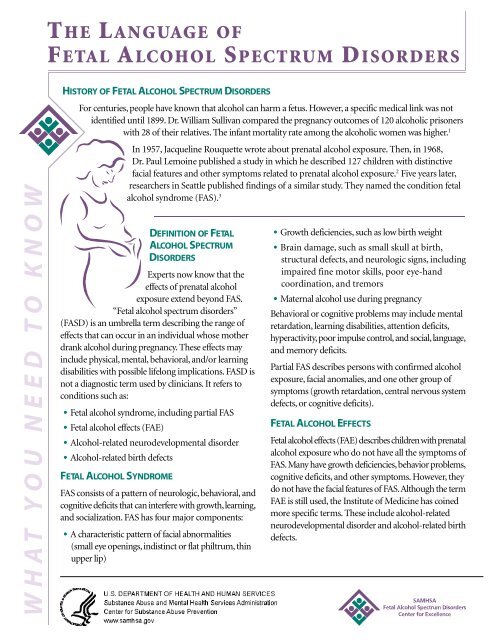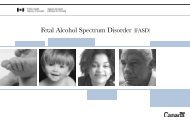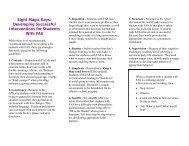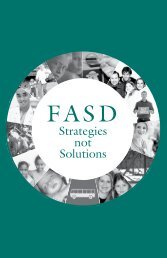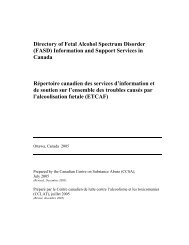the language of fetal alcohol spectrum disorders - Acbr.com
the language of fetal alcohol spectrum disorders - Acbr.com
the language of fetal alcohol spectrum disorders - Acbr.com
You also want an ePaper? Increase the reach of your titles
YUMPU automatically turns print PDFs into web optimized ePapers that Google loves.
T HE LANGUAGE OFF ETAL A LCOHOL SPECTRUM DISORDERSHISTORY OF FETAL ALCOHOL SPECTRUM DISORDERSFor centuries, people have known that <strong>alcohol</strong> can harm a fetus. However, a specific medical link was notidentified until 1899. Dr. William Sullivan <strong>com</strong>pared <strong>the</strong> pregnancy out<strong>com</strong>es <strong>of</strong> 120 <strong>alcohol</strong>ic prisonerswith 28 <strong>of</strong> <strong>the</strong>ir relatives. The infant mortality rate among <strong>the</strong> <strong>alcohol</strong>ic women was higher. 1In 1957, Jacqueline Rouquette wrote about prenatal <strong>alcohol</strong> exposure. Then, in 1968,Dr. Paul Lemoine published a study in which he described 127 children with distinctivefacial features and o<strong>the</strong>r symptoms related to prenatal <strong>alcohol</strong> exposure. 2 Five years later,researchers in Seattle published findings <strong>of</strong> a similar study. They named <strong>the</strong> condition <strong>fetal</strong><strong>alcohol</strong> syndrome (FAS). 3DEFINITION OF FETALALCOHOL SPECTRUMDISORDERSExperts now know that <strong>the</strong>effects <strong>of</strong> prenatal <strong>alcohol</strong>exposure extend beyond FAS.“Fetal <strong>alcohol</strong> <strong>spectrum</strong> <strong>disorders</strong>”(FASD) is an umbrella term describing <strong>the</strong> range <strong>of</strong>effects that can occur in an individual whose mo<strong>the</strong>rdrank <strong>alcohol</strong> during pregnancy. These effects mayinclude physical, mental, behavioral, and/or learningdisabilities with possible lifelong implications. FASD isnot a diagnostic term used by clinicians. It refers toconditions such as:• Fetal <strong>alcohol</strong> syndrome, including partial FAS• Fetal <strong>alcohol</strong> effects (FAE)• Alcohol-related neurodevelopmental disorder• Alcohol-related birth defectsFETAL ALCOHOL SYNDROMEFAS consists <strong>of</strong> a pattern <strong>of</strong> neurologic, behavioral, andcognitive deficits that can interfere with growth, learning,and socialization. FAS has four major <strong>com</strong>ponents:• A characteristic pattern <strong>of</strong> facial abnormalities(small eye openings, indistinct or flat philtrum, thinupper lip)• Growth deficiencies, such as low birth weight• Brain damage, such as small skull at birth,structural defects, and neurologic signs, includingimpaired fine motor skills, poor eye-handcoordination, and tremors• Maternal <strong>alcohol</strong> use during pregnancyBehavioral or cognitive problems may include mentalretardation, learning disabilities, attention deficits,hyperactivity, poor impulse control, and social, <strong>language</strong>,and memory deficits.Partial FAS describes persons with confirmed <strong>alcohol</strong>exposure, facial anomalies, and one o<strong>the</strong>r group <strong>of</strong>symptoms (growth retardation, central nervous systemdefects, or cognitive deficits).FETAL ALCOHOL EFFECTSFetal <strong>alcohol</strong> effects (FAE) describes children with prenatal<strong>alcohol</strong> exposure who do not have all <strong>the</strong> symptoms <strong>of</strong>FAS. Many have growth deficiencies, behavior problems,cognitive deficits, and o<strong>the</strong>r symptoms. However, <strong>the</strong>ydo not have <strong>the</strong> facial features <strong>of</strong> FAS. Although <strong>the</strong> termFAE is still used, <strong>the</strong> Institute <strong>of</strong> Medicine has coinedmore specific terms. These include <strong>alcohol</strong>-relatedneurodevelopmental disorder and <strong>alcohol</strong>-related birthdefects.
ALCOHOL-RELATED NEURODEVELOPMENTALDISORDERAlcohol-related neurodevelopmental disorder (ARND)refers to various neurologic abnormalities, such as problemswith <strong>com</strong>munication skills, memory, learning ability, visualand spatial skills, intelligence, and motor skills. Childrenwith ARND have central nervous system deficits but notall <strong>the</strong> physical features <strong>of</strong> FAS. Their problems may includesleep disturbances, attention deficits, poor visual focus,increased activity, delayed speech, and learning disabilities.Origin and Impact <strong>of</strong> FASDCAUSE OF FASDThe only cause <strong>of</strong> FASD is <strong>alcohol</strong> use during pregnancy.When a pregnant woman drinks, <strong>the</strong> <strong>alcohol</strong> crosses<strong>the</strong> placenta into <strong>the</strong> <strong>fetal</strong> blood system. Thus, <strong>alcohol</strong>reaches <strong>the</strong> fetus, its developing tissues, and organs.This is how brain damage occurs, which can lead tomental retardation, social and emotional problems,learning disabilities, and o<strong>the</strong>r challenges.No <strong>alcohol</strong> consumption is safe during pregnancy. Inaddition, <strong>the</strong> type <strong>of</strong> <strong>alcohol</strong> (beer, wine, hard liquor,wine cooler, etc.) does not appear to make a difference.PREVALENCE OF FASDFASD occurs in about 10 per 1,000 live births, or about40,000 babies per year. FAS, <strong>the</strong> most recognizedcondition in <strong>the</strong> <strong>spectrum</strong>, is estimated to occur in 0.5to 2 per 1,000 live births. 4 It now outranks Downsyndrome and autism in prevalence.ALCOHOL-RELATED BIRTH DEFECTSAlcohol-related birth defects (ARBD) describe defectsin <strong>the</strong> skeletal and major organ systems. Virtually everydefect has been described in some patient with FAS.They may include abnormalities <strong>of</strong> <strong>the</strong> heart, eyes,ears, kidneys, and skeleton, such as holes in <strong>the</strong>heart, underdeveloped kidneys, and fusedbones.ASSESSMENT OF FASDIt is extremely difficult to diagnose a <strong>fetal</strong> <strong>alcohol</strong><strong>spectrum</strong> disorder. A team <strong>of</strong> pr<strong>of</strong>essionals is needed,including a physician, psychologist, speech pathologist,and physical or occupational <strong>the</strong>rapist. Diagnostic testsmay include physical exams, intelligence tests, andoccupational and physical <strong>the</strong>rapy, psychological, speech,and neurologic evaluations.Diagnosis is easier if <strong>the</strong> birth mo<strong>the</strong>r confirms <strong>alcohol</strong>use during pregnancy. However, FAS can be diagnosedwithout confirming maternal <strong>alcohol</strong> use, if all <strong>the</strong>symptoms are present.IMPACT OF FASDChildren with FASD <strong>of</strong>ten grow up with social andemotional problems. They may have mental illness orsubstance abuse problems, struggle in school, and be<strong>com</strong>einvolved with <strong>the</strong> corrections system. Costs <strong>of</strong> FAS aloneare estimated at between 1 and 5 million dollars perchild, not including incarceration. This estimate doesnot include cost to society, such as lost productivity,burden on families, and poor quality <strong>of</strong> life. 5REFERENCES1. Abel, E.L. 1990. Fetal Alcohol Syndrome. Oradell, NJ: Medical Economics.2. Lemoine, P.; Harousseau, H.; Borteyru, J.-P., et al. 1968. Les enfants de parents alcooliques: Anomalies observees. A propos de 127 cas [Children<strong>of</strong> <strong>alcohol</strong>ic parents: Abnormalities observed in 127 cases]. Ouest Medical 21:476–482.3. Jones, K.L., and Smith, D.W. 1973. Recognition <strong>of</strong> <strong>the</strong> <strong>fetal</strong> <strong>alcohol</strong> syndrome in early infancy. Lancet 2:999–1001.4. May, P.A., and Gossage, J.P. 2001. Estimating <strong>the</strong> prevalence <strong>of</strong> <strong>fetal</strong> <strong>alcohol</strong> syndrome: A summary. Alcohol Research & Health 25(3):159–167.5. Kellerman, C., and Kellerman, T. 1999. The five million dollar baby: The economics <strong>of</strong> FAS.(http://<strong>com</strong>e-over.to/FAS/economicsFAS.htm on 04/04/02).If you’re pregnant, don’t drink. If you drink, don’t get pregnant.For more information, visit fascenter.samhsa.gov or call 866-STOPFAS.05/04


